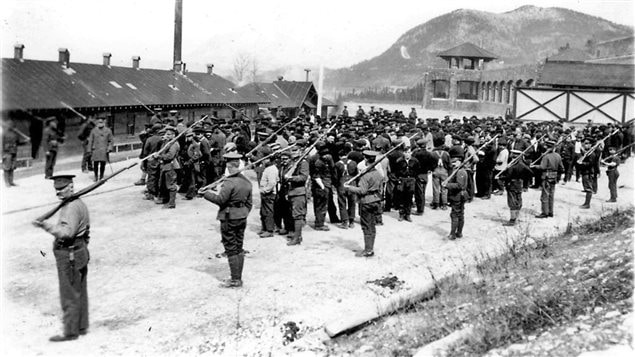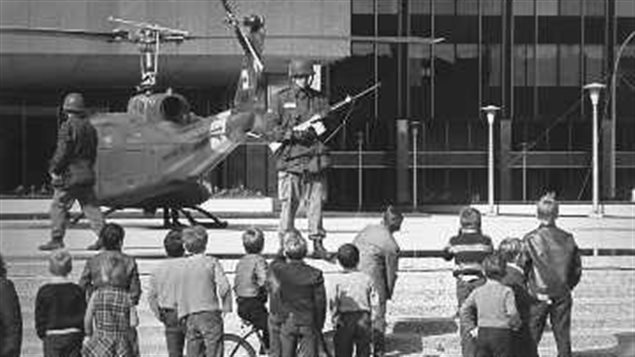History: August 22, 1914: War Measures Act
At the start of First World War, the Canadian Government voted in an “Act to confer certain powers upon the Governor-in-Council in the event of war, invasion, or insurrection, real or apprehended”. The proposal came in effect on August 22, 1914, and was retroactive to the beginning of the month.
Commonly known as the “War Measures Act” it gave Canada’s government leaders sweeping powers over society and civil liberties without having first to resort to Parliamentary approval and vote.
It gave the government powers including:
- – restrictions on freedom of speech, i.e. censorship and suppression of publications, writings, photos, maps, and means of communication (including such things as letters, and broadcasts)
- -(b) arrest, detention, exclusion and deportation;
- (c) control of the harbours, ports and territorial waters of Canada and the movements of vessels;
- (d) transportation by land, air, or water and the control of the transport of persons and things;
- (e) trading, exportation, importation, production and manufacture;
- (f) appropriation, control, forfeiture and disposition of property and of the use thereof.
- It could for example, order a company to stop producing certain domestic products, and instead produce items for the war effort.
- It allowed arrests and detentions without trial, banning membership in certain religious or political groups or activities, and control over prices and wages.
On this first occasion, the Act remained in force until January 10, 1920.
As time would later prove, the Act allowed for actions which later would be deemed unnecessary and indeed reprehensible. In World War I, this included the internment of thousands of Canadians of Ukrainian origin, deemed “enemy aliens” and stripped of certain possessions. Many Germans and Austrians were also interned as potential threats.
This would occur again when the Act was invoked a second time during World War II, when Japanese Canadians were also perceived as threats and many had their land and possessions confiscated and were sent to internment camps.
 Banff Alberta in World War I, During both world wars, about two dozen internment camps were set up across Canada, which often involved forced labour. While several thousand *enemy aliens* were interned, many thousands of others were left at large but required to report regularly to police." />
Banff Alberta in World War I, During both world wars, about two dozen internment camps were set up across Canada, which often involved forced labour. While several thousand *enemy aliens* were interned, many thousands of others were left at large but required to report regularly to police." />
The third and final time the War Measures Act was invoked was in 1970. This was during the so-called “October Crisis” when the Marxist influenced Quebec separatist group, the Front de Libération du Québec (FLQ) kidnapped a British diplomat in Canada, and the Quebec cabinet minister Pierre Laporte whom they later murdered..
This came after years of bombings and robberies in which many citizens were maimed and some killed.
The ongoing terrorist threat was deemed by both the Quebec and federal governments to be an apprehended insurrection, theoretically justifying the invocation of the War Measures Act.
 In October 1970, the Quebec government requested the assistance of the Canadian Armed Forces to help protect politicians and important buildings during the October Crisis. Pictured here, children watching soldiers guarding the Quebec Provincial Police headquarters in Montreal." />
In October 1970, the Quebec government requested the assistance of the Canadian Armed Forces to help protect politicians and important buildings during the October Crisis. Pictured here, children watching soldiers guarding the Quebec Provincial Police headquarters in Montreal." />
The shocking presence of armed military personnel in the streets of cities like Hull, (across the river from the national capital, Ottawa) Montreal and Quebec City and others was virtually unheard of in Canadian history, and along with mass arrests of hundreds of suspected separatist sympathizers.
it led to such an outcry in the province that the Act was later repealed to be replaced with the much less sweeping Emergencies Act in 1988.
additional information-sources
- Emergencies Act
- CBC- 2010- War Measures anniversary, controversial
- Without Just Cause- Ukrainian internment WWI

 Banff Alberta in World War I, During both world wars, about two dozen internment camps were set up across Canada, which often involved forced labour. While several thousand *enemy aliens* were interned, many thousands of others were left at large but required to report regularly to police." />
Banff Alberta in World War I, During both world wars, about two dozen internment camps were set up across Canada, which often involved forced labour. While several thousand *enemy aliens* were interned, many thousands of others were left at large but required to report regularly to police." /> In October 1970, the Quebec government requested the assistance of the Canadian Armed Forces to help protect politicians and important buildings during the October Crisis. Pictured here, children watching soldiers guarding the Quebec Provincial Police headquarters in Montreal." />
In October 1970, the Quebec government requested the assistance of the Canadian Armed Forces to help protect politicians and important buildings during the October Crisis. Pictured here, children watching soldiers guarding the Quebec Provincial Police headquarters in Montreal." />